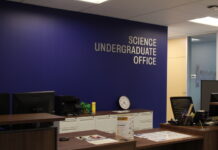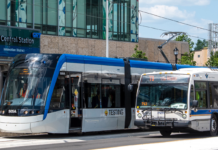With over 3,000 of UW’s 30,000 students identifying as Muslim, in this spirit, Islamic Awareness Week (IAW) run by the Muslim Student Association (MSA) from March 14-16 sought to bring together Muslim and non-Muslim students alike to explore the common humanity between all people.</p>
In the SLC, multiple booths were set up during the three days for students to have their name written in Arabic, get henna tattoos, and learn about the core tenents of Islam. In addition, events like “Muslims Got Talent,” a multifaith panel, and a panel regarding Islam and women’s issues with Islamic scholar Rabia Kher provided a more in-depth understanding of the Islamic experience.
“[Islamic Awareness Week] attempts to create a safe and engaging platform where Muslims and people of other faiths can interact with each other and engage in fruitful dialogue about matters that concern both,” said Habiba Mubashsher, the lead organizer of IAW.
The experiences of Muslim students on campus are as unique as the students themselves and their roots.
“Islam is not an alien system nor is it an immigrant faith, as many would assume,” said Tahbit Chowdhury, a previous MSA vice-president. “Muslims have roots in the Baltics for six centuries, in the Americas since the transatlantic slave trade, in the Balkans, and deep into central and Southeast Asia. There’s nothing foreign or alien about our footprints.”
Although Muslim students are all different, the experience of being a student practicing Islam has its own concerns. Both the event and MSA itself provide an opportunity for Muslim students to represent their faith on campus, and bring to light the challenges Muslim students face.
Dealing with cultural differences is especially difficult for international students.
“When I came to Canada, the customs were very different — handshakes, hellos, and other such interactions are very common here [in Canada]. Trying to follow our traditions and adhere to Islamic values is hard sometimes in such a multicultural society,” Adil Ashraf, a Muslim student, said.
Cultural differences between some Muslim students and the general student body can often alter how these students function in the greater campus experience.
Jennifer Yuen, who recently embarked on a trip through the Staff International Experience Fund to Indonesia and Turkey in order to learn how to better help with Muslim-specific issues in health services, is an example of how these issues are being treated on a systemic level.
The IAW exists to bring attention to issues facing Muslim students and to help break stereotypes of Muslims and Islam, according to Mubashsher.
“We feel that the best way to respond to anti-Muslim bigotry is to highlight the diversity of Muslims, the commonalities between Islam and other faiths, and to encourage the empowerment of Muslim women,” Mubashsher said.
Anti-Muslim bigotry is not completely foreign to the KW region. In the wake of the terrorist attacks in Paris in November 2015, local woman Sarah Shafiq, part of Coalition of Muslim Women of KW, opened a temporary hotline for women to report anti-Muslim confrontations.
Despite this, Chowdhury assures that “anti-Muslim sentiments are incredibly rare in KW.”
As proposed by Mubashsher, a large part of eliminating the stigma around Islam is through education, which IAW sought to provide. Outside of IAW, the university also offers a studies in Islam program that creates a space for students to study Islam.
Whether providing insight into Islam, creating a forum for Muslim students to address issues, or helping to alleviate the stigma of Muslim students the “IAW essentially aimed to provide an inspirational retreat where one can question their own spirituality and broaden their understanding of Islam,” Mubashsher said.































